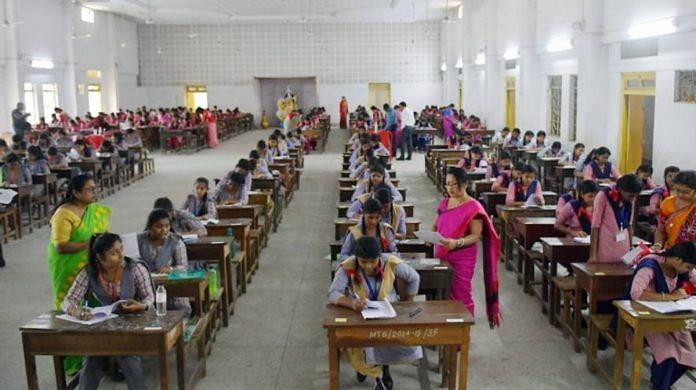New Delhi: Starting with the upcoming board examinations for classes 10 and 12, the Central Board of Secondary Education (CBSE) wants to use not just CCTV surveillance and external invigilators, but also data analytics to identify malpractice and cheating at exam centres.
CBSE board exams for Class 10 and 12 are being conducted in two parts for the 2021-22 academic session — term 1 exams are scheduled to begin from 16 November. They will be Multiple Choice Question (MCQ)-based exams, administered through OMR sheets.
The board said in a statement Tuesday that “it will use advanced data analytics to detect, respond and therefore, in the long run, prevent any irregularities in academic testing across all major CBSE administered exams in the country”.
“This will be used to strengthen the reliability of National Achievement Survey (NAS), Central Teachers Eligibility Test (CTET), and Board examinations conducted by CBSE,” it added.
Also read: Take responsibility of self-prescribed books — education ministry issues guidelines to schools
‘Study algorithms and patterns to catch malpractice’
“Using data forensics we will study the algorithms and patterns at exam centres to catch malpractice and if anything is detected at any centre, appropriate action will be taken,” a senior official from CBSE’s IT team told ThePrint.
The board will study patterns where two or more students or the entire class has similar answers to a question or in case more than one student or a bunch of students have missed answering a question. “Such patterns will give us a clue that there is something wrong with the exam centre and we will flag it for malpractice,” the official said.
“So far, the board has been ensuring all efforts to prevent use of unfair means and practices during the conduct of examinations in physical terms, through monitoring by appointing external observers/flying squads and use of CCTV,” he added.
Data analytics will be a step forward in the same direction.
“CBSE has decided to improve upon its existing methods by using advanced data analytics to detect cases/centres where there are high probabilities of recourse to unfair means during examinations.”
The CBSE statement added that a pilot analysis for this had been carried out in the CTET examination held in January 2021, in collaboration with the Central Square Foundation (CSF) and Playpower Labs, to develop algorithms to identify suspicious data patterns at the centre and the individual test-taker level.
“Based on the analysis results and the algorithms developed, CBSE has decided that such analysis will be extended to other administered examinations,” it added.
“Post this, appropriate measures can be taken by CBSE to strengthen the reliability of the examinations and to deter any such malpractices in the future,” it stated.
(Edited by Poulomi Banerjee)
Also read: Nobody knows the fate of our ‘out-of-school’ children. Enrolment data is insufficient



